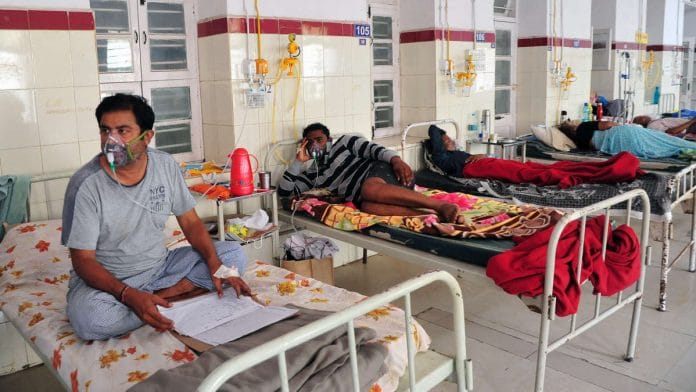New Delhi: The Covid pandemic brought unforeseen challenges in front of India. But it may have wiped out, to some extent, years of health infrastructure shortage.
Since the first Covid case was reported in the country, there has been a near seven-fold increase in oxygen beds in the country, a 41-fold rise in isolation beds and a 44-fold jump in ICU beds, the Ministry of Home Affairs told the Supreme Court in an affidavit Saturday in a Covid death certificates case.
There were just 50,583 oxygen supported beds in the country when Covid hit but currently there are 3,81,758 oxygen beds, the apex court was told.

The number of isolation beds is up from 41,000 to 17,17,227 while the total number of ICU beds is up from 2,500 to 1,13,035. There were just 163 Covid dedicated hospitals earlier, now there are 4,096, the affidavit said.
There are also 7,929 Category II Covid health centres and 9,954 dedicated Covid care centres now. These are basically quarantine facilities depending on how sick a person is. None of these were there before the pandemic.
India also has 5,601 railway isolation coaches — yet another addition during the pandemic.
Covid care centres offer care only for cases that have been clinically assigned as ‘mild’ or ‘very mild’ tags or ‘Covid suspect’. A dedicated Covid health centre is a hospital that offers care for all cases that have been clinically assigned as ‘moderate’. Dedicated Covid hospitals offer comprehensive care primarily for those who have been clinically assigned as ‘severe’.
“It is submitted that such support for fighting the pandemic situation has consisted of ramping up the health infrastructure in a short time, which include testing, treatment, and quarantine facilities on large-scale on the one hand, and augmenting hospital facilities, which include oxygenated beds, ventilators, and ICU facilities, on the other, in which the fund of not only NDRF but even from the Consolidated Fund of India is being spent. It is submitted that this is an on-going effort, which will have to be and is being scaled up further in response to successive waves of Covid-19,” the government told the court.
It also said that over 150,000 health personnel were engaged during the pandemic. This included 7,024 medical officers, 3,680 specialists, 35,996 staff nurses, 1,01,155 community volunteers, Accredited Social Health Activist (ASHA) and ASHA facilitators apart from 48,453 other support staff.
Also read: Covid death after 30 days in hospital will also be eligible for compensation: New guidelines
Poor health spend in the country
India’s chronic under-spending on healthcare has been one of the reasons for the severe infrastructure limitations in the country.
According to the Economic Survey 2020-21, India ranks 179th out of 189 countries in prioritisation accorded to health in its government budgets. The infrastructure limitations also means that India has one of the lowest hospitalisation rates in the world.
“At 3-4 per cent, the hospitalisation rates in India are among the lowest in the world; the average for middle income countries is 8-9 per cent and 13-17 per cent for OECD countries,” the survey said.
The National Health Profile 2020, which looked at the health infrastructure position in the country as it stood on 31 December 2019, reported that the country has a total of 8,18,396 hospital beds but didn’t give a breakup of oxygen supported and ICU beds in the country.
(Edited by Amit Upadhyaya)
Also read: What the next 6 months of the Covid pandemic will bring






